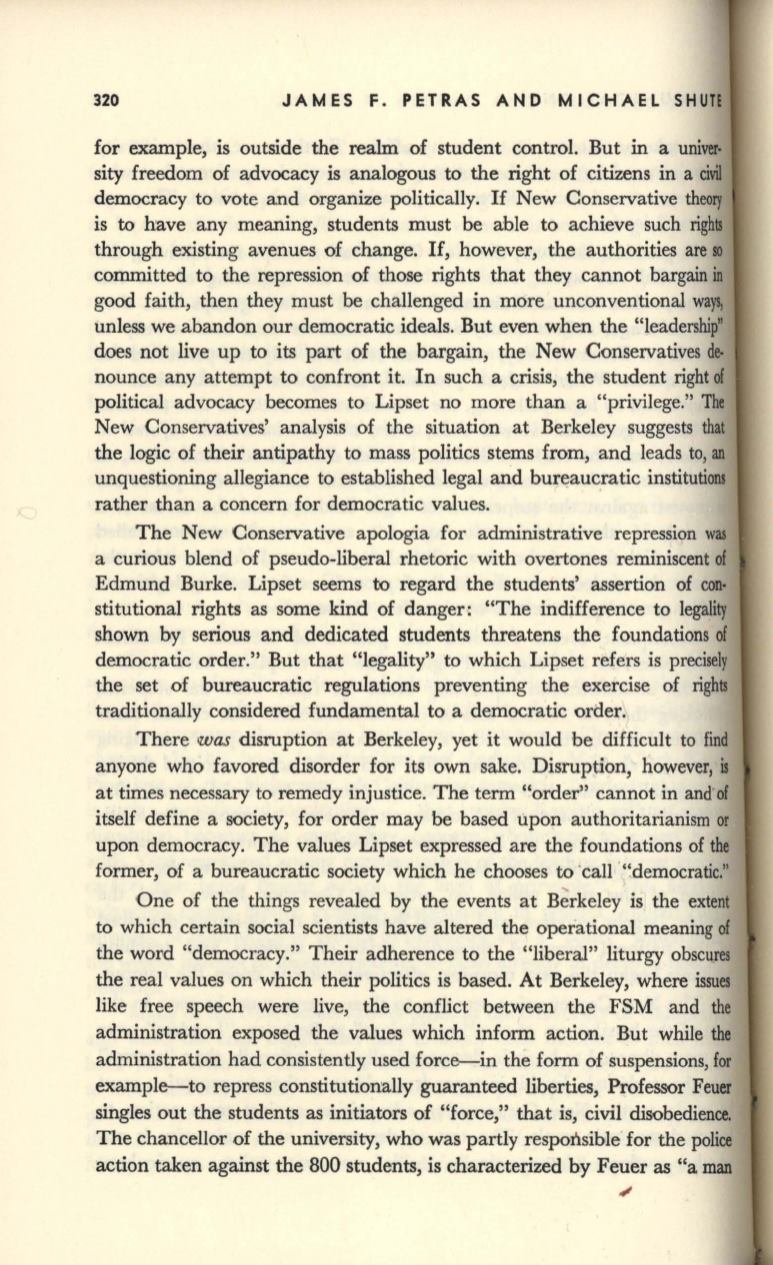
320
JAMES F. PETRAS AND MICHAEL SHUTE
for example, is outside the realm of student control. But in a
uniwr–
sity freedom of advocacy is analogous to the right of citizens in a
civiJ
democracy to vote and organize politically.
If
New Conservative
theory
is to have any meaning, students must be able to achieve such righll
through existing avenues of change.
If,
however, the authorities are .,
committed to the repression of those rights that they cannot bargain
in
good faith, then they must be challenged in more unconventional
ways,
unless we abandon our democratic ideals. But even when the "leadership'
does not live up to its part of the bargain, the New Conservatives
de–
nounce any attempt to confront it. In such a crisis, the student right
m
political advocacy becomes to Lipset no more than a "privilege."
The
New Conservatives' analysis of the situation at Berkeley suggests
that
the logic of their antipathy to mass politics stems from, and leads to,
aD
unquestioning allegiance to established legal arid
bur~aucratic
institutiOOl
rather than a concern for democratic values.
The New Conservative apologia for administrative repression
was
a curious blend of pseudo-liberal rhetoric with overtones reminiscent
m
Edmund Burke. Lipset seems to regard the students' assertion of
coo–
stitutional rights as some kind of danger: "The indifference to legality
shown
by
serious and dedicated students threatens the foundations
ci
democratic order." But that "legality" to which Lipset refers is
precise~
the set of bureaucratic regulations preventing the exercise of righll
traditionally considered fundamental to a democratic order.
There
was
disruption at Berkeley, yet it would be difficult to find
anyone who favored disorder for its own sake. Disruption, however,
i
at times necessary to remedy injustice. The tenn "order" cannot in and'of
itself define a society, for order may be based upon authoritarianism or
upon democracy. The values Lipset expressed are the foundations of
the
former, of a bureaucratic society which he chooses to 'call '''democratic.''
One of the things revealed by the events at
B~rkeley
is the extent
to which certain social scientists have altered the operational meaning of
the woro "democracy." Their adherence to the "liberal" liturgy obscures
the real values on which their politics is based. At Berkeley, where
issues
like free speech were live, the conflict between the FSM and
the
administration exposed the values which infonn action. But while
the
administration had consistently used force-in the fonn of suspensions, for
example-to repress constitutionally guaranteed liberties, Professor Feuer
singles out the students as initiators of "force," that is, civil disobedience.
The chancellor of the university, who was partly responsible' for the police
action taken against the 800 students, is characterized by Feuer as "a man
,


